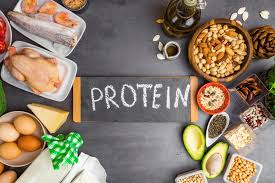
Protein 101
PROTEIN BUILDS MUSCLE
If you are eating a whole-food diet that includes meat you are mostly getting enough protein for the average person. That looks like 50g of protein give or take if we make things simple. This amount is to keep from being deficient not for building muscle. However, the subject of protein and protein intake is much more nuanced than just eating a chicken breast with spinach.
GOALS
First, you must understand your dietary goals. Protein is the main building block to building lean muscle and it is a heavy contributor to preventing weight gain and aiding in fat loss. The more protein you consume the more emphasis you should be putting on your resistance training goals.
Protein is a macronutrient. It is essential to your body’s needs alongside fats and carbohydrates. Our body is capable of making things like glucose and nitric oxide on its own. We can also naturally make 11 of the 20 amino acids. In order for those 11 amino acids to properly function we need to consume the other 9 through protein.
NOT ALL PROTEINS ARE CREATED EQUAL
- Animal Proteins
- Vegetable Proteins
- Synthetic Supplemental Proteins
Proteins come in a complete form or incomplete form. Simply put, a complete protein will have all 9 essential amino acids included. An incomplete protein will only contain a variety of the 9 essential amino acids.
The best source for complete proteins is animal proteins. Pasture-raised eggs are the most bioavailable protein you can consume and are considered a superfood. Wild-caught fish, grass-fed red meat, pasture-raised poultry, and grass-fed dairy provide the best quality protein sources for your diet.
Vegetable proteins are incomplete proteins. Incomplete proteins shouldn’t be vilified at all. They are still a beneficial source of protein and can be consumed with other complementary protein sources throughout the day.
Synthetic proteins are hit or miss. Some are really well designed. You should do thorough research on any synthetic protein you plan to buy.
Synthetic proteins can have the same classification as incomplete proteins. One major advantage is they help you reach your daily protein goals much easier than eating truckloads of meat which will fill and satiate you quickly.
A brand we recommend is Optimum Nutrition Gold Standard Whey Protein: BUY HERE!
HOW MUCH PROTEIN TO BUILD MUSCLE
This depends on your body weight. The bigger you are the more you need, conversely if you’re smaller you don’t need as much. Understandably this can get confusing because if your body weight numbers dictate obesity, it is possible that what you calculate for your daily protein intake can be a bit high and unmanageable. Take a common sense approach to this and look at your height in relation to what your weight would be if you were lean. This could give you a reasonable daily protein goal despite excess weight.
For muscle building strictly, a good rule of thumb is to consume 1g of protein per pound of body weight. (NOTE: Again, assuming a lean body weight for your height.) If you are trying to build muscle as a man at 170lbs, eating 150-170lbs of protein per day is ideal. It is important to understand that consuming that much protein in one sitting isn’t ideal and in most cases not even possible. Breaking it up throughout the day is your best strategy. Muscle protein synthesis cycles in 3-hour intervals. So your protein intake should be in 3-4 hour intervals.
It must be stated that protein can be wasted. If you consume 1g of protein per body weight absolutely must include a resistance training regimen in your daily exercise routine. Protein is designed to work. Imagine sending a bunch of construction workers to a building site with no tools or equipment. They can’t do their job in those conditions. Protein needs a reason to build. Get in the gym and tear down those muscle walls so protein can come in and keep building them bigger and stronger.

Leave a Reply
You must be logged in to post a comment.